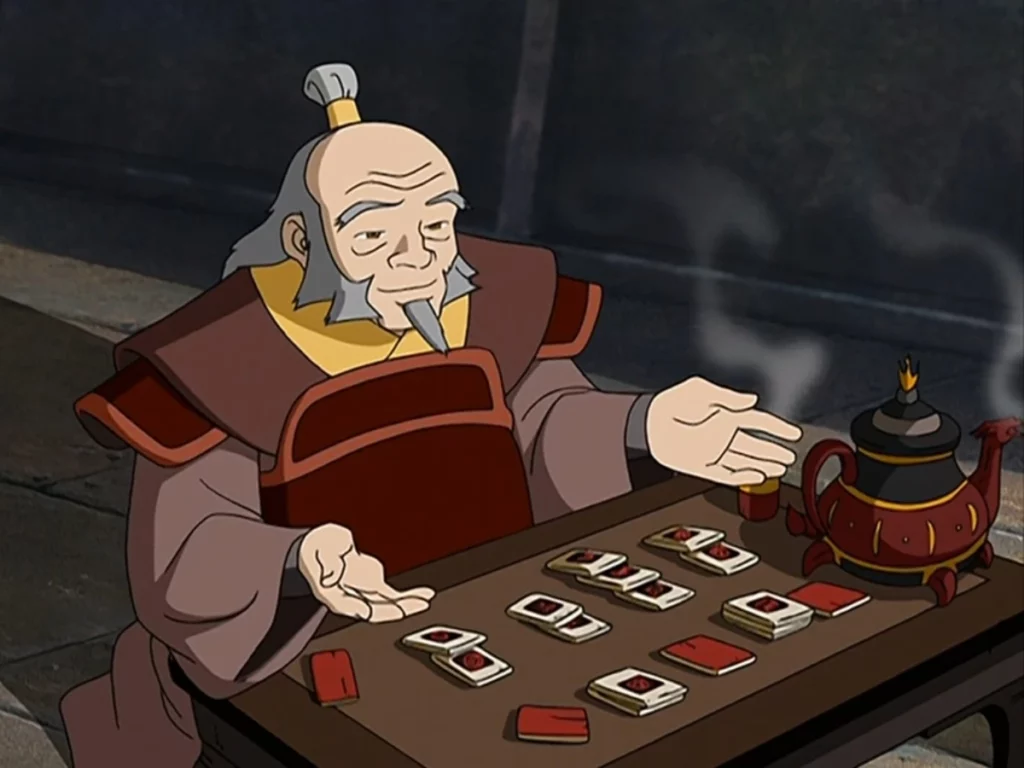
Dominant Extraverted Feeling – Fe:
Iroh’s journey offers an interesting illustration of Fe in evolution. We don’t see much of him before the main story, but Iroh’s Fe is evident, even when he wasn’t yet Zuko’s mentor or a advisor to Team Avatar.
Before the tragic loss of his son, his Fe was predominantly channeled into his role as a general of the Fire Nation, where his empathetic nature was seen only by those close to him, like his family and soldiers.
The death of his son marked a profound turning point, catalyzing a significant shift in his Fe. This loss not only devastated him personally but transformed him from a military leader into a compassionate mentor. This transformation is mostly shown through his relationship with Prince Zuko, when he empathize, guide, and support Zuko through his complex journey of self-discovery and redemption.
Iroh’s Fe not only makes him wise and caring figure, but also helps him establish unlikely connections through the story and offer great guidance and support to those around him.
Auxiliary Introverted Intuition – Ni:
Iroh’s Ni is a more subtle yet still powerful aspect of his character, often overshadowed by his more visible Fe traits. His Ni manifests as a deep insight into the nature of people and events, enabling him to offer profound guidance and make strategic decisions.
Iroh not only provides deep philosophical insights, but emanates a grounding force throughout the series, particularly during moments of crisis, where he helps Zuko to look beyond immediate circumstances and consider the broader picture of his life and identity. This depth of foresight is vividly contrasted with another Fire Nation military man, Admiral Zhao (ENTJ), who uses his auxiliary Ni differently, displaying a more superficial and goal-oriented strategic approach. Zhao’s plans (highly influenced by his dominant Te) are more immediate and rarely undergo changes after being once set, while Iroh’s ability to play the long game, both literally (as seen in his Pai Sho strategies) and metaphorically (in his guidance and actions throughout the series), is a great showcase how all function in his stack compliment each other to create healthy and strong personality.
Tertiary Extraverted Sensing – Se:
Iroh’s Se is evident in his deep appreciation for the present moment and life’s simple pleasures. Extraverted Sensing, though not dominant in his stack, plays a significant role in Iroh’s overall approach to life. Throughout the story Iroh is consistently shown finding joy in everyday activities, such as his love for brewing and savoring tea or his strategic and yet playful engagement with the game of Pai Sho.
Iroh’s ability to connect with the present not only helps him in fights, but also showcasing his ability to appreciate and find solace in the tangible aspects of life, grounding his more abstract Ni and Fe functions in the tangible realities of the world.
In contrast to his nephew Zuko (ISFP), whose intense and reactive Se often leads him into conflict and emotional turmoil, Iroh’s Se is more measured and reflective. Zuko’s experiences, particularly in high-stress situations, demonstrate a struggle to balance his intense sensory reactions with his internal compass. Iroh, on the other hand, exhibits a seasoned and mature use of Se. His ability to remain present and find joy in the small things, even in times of turmoil, speaks to a well-developed Se that complements his dominant and auxiliary functions, allowing Iroh to connect with people and the world in a way that is both profound and relatable.
Inferior Introverted Thinking – Ti:
Iroh’s Ti is perhaps the most understated aspect of his personality, as it is subtly interwoven through his deep understanding and appreciation of various cultures, philosophies, and bending styles, which he seamlessly integrates into his own knowledge framework.
When Zuko often looks outward to find his place and purpose, relying on external structures and expectations (Te), Iroh relies more on his internal logic and understanding to guide his actions and beliefs, developing his own internal framework instead of seeking external systems.
This internal logic system is crucial in Iroh’s role as a mentor and strategist, enabling him to offer advice and solutions that are not only empathetic (Fe) and insightful (Ni) but also logically sound and well-informed.